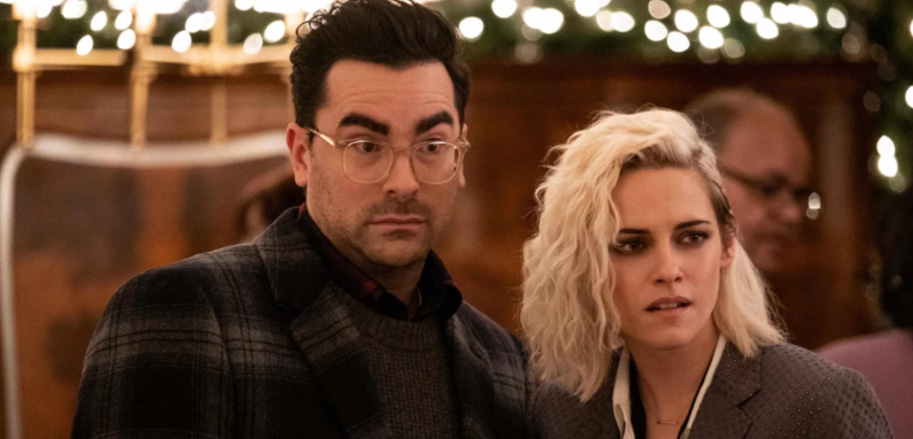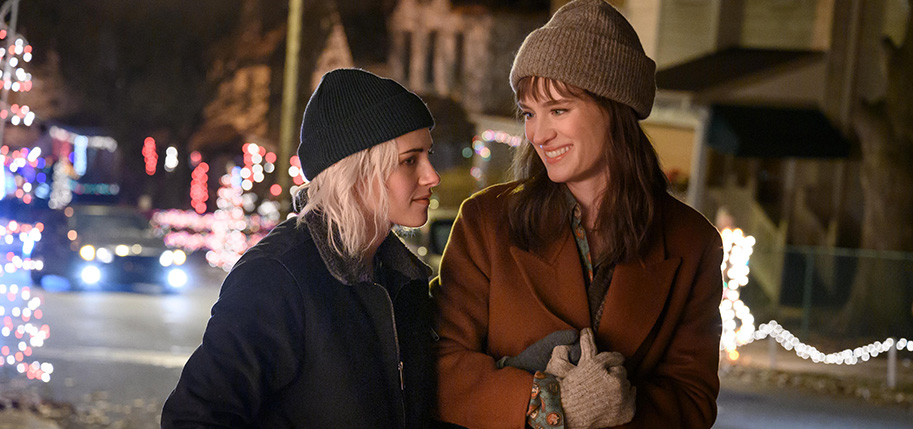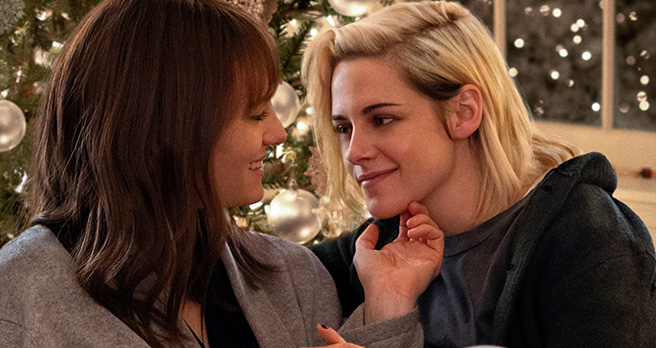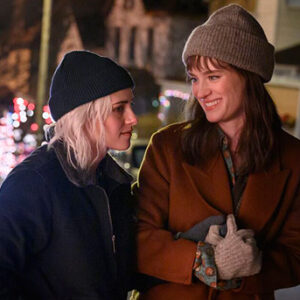Last Updated on August 2, 2021
PLOT: A woman, Abby, is brought to her girlfriend Harper's family house for Christmas, only to discover she's been hiding a rather huge secret from the rest of her seemingly well-off family.
REVIEW: In more ways than can fill a stocking over the fireplace, director Clea DuVall’s HAPPIEST SEASON deserves its place on the mantle alongside some of the most revered holiday classics. Aside from being ugly-laugh funny and featuring one of the best ensembles of the year, DuVall and her team have broken down a barrier in the genre by crafting a mainstream, gay Christmas movie that feels most special when it's both deeply romantic or dissecting what it means to be part of a family that is far from the perfect picture plastered on that year’s Christmas card.
Granted, it’s not that other Christmas-set movies haven’t used the dysfunctional family structure to ultimately get to a tender message about general tenderness and what the holidays really mean — usually something about family and whatnot. Rather, what DuVall and co-writer Mary Holland avoid with their story is the half-hearted sentimentality and over-the-top chaos that stops many others in the genre from – while admittedly offering something undemanding and often pleasant – genuinely getting to the root of something meaningful. By centering the movie on couple Harper (Mackenzie Davis) and Abby (Kristen Stewart), they not only provide a dynamic that’s incredibly refreshing, but they then use it to set the stage for a story that explores familiar themes of family and togetherness, and how toxicity can pervade any family structure and force its members to become people they're not. It very quickly, and executed with clarity and vision, dives into the ugly (but still sometimes hilarious) side of family, and in the case of the love story between Abby and Harper, what it means to join one and feel a sense of otherness in the process.

That sense of otherness is explored most directly via Abby, who is madly in love with the confident, adventurous, Christmas-loving Harper, who brings her to spend the holidays with her wealthy family. Making matters complicated beyond an awkward family dinner is the fact Harper has not come out to her family yet and doesn’t tell Abby this until they’re already in the car and miles down the road. With Harper avoiding coming out to her family so as to not interfere with her father’s (Victor Garber) mayoral campaign — and we soon learn for many other reasons — Abby has to sit on the sidelines and come face to face with a side of Harper she’s never seen before. Less the care-free woman she fell in love with, the façade Harper puts on begins to mirror more of her family’s, all of whom are all a different variety of intense, like her controlling mother, Tipper (Mary Steenburgen), her uptight, uber-competitive sister, Sloane (Alison Brie), and her other, hilariously manic sister, Jane (Holland).
With an excellent script and talented cast in tow, DuVall as director weaves between the complexities of every character to paint a full-bodied portrait of this very flawed family. Working with Stewart to craft a warm, confused, relatable character who is being forced to reckon with becoming part of a family that may never accept her — or their own daughter/sister, for that matter — as well as being with a partner who seems to be embarrassed by revealing their true nature to her family. While it certainly feels like Abby’s journey, for the most part, DuVall did an exceptional job working with the cast to make them fully fleshed out and that every ounce of their interweaving dynamics feels worthwhile to the story. That goes not only for small moments where Steenburgen’s Tipper can let the cracks in her elegant demeanor show, or for the moments when Brie’s Sloane can show her insecurity towards Harper’s placement in her father’s life, but also for the much-needed sense of humor from Holland’s Jane, who by being so unabashedly odd and bursting with creativity she can’t help but be the most lovable person in the family, despite being the most overlooked among them.
This is an entire family – with the exception of the wonderful Jane – who has crafted their persona based on how they believe the family sees them, and this makes for the most potent examination when it comes to Harper. Her journey of coming out to her parents – experienced for us through the perspective of Abby – stems directly from that insecurity and feeling like she needs to be a certain way around her family, let alone during the happiest season of all when they're all together. While it’s easy to look at her actions and be as fed up with her as Abby is (and if you’re like me, kind of wanting the latter to move on and explore things with Harper’s high school ex who makes her way into the picture, Riley, played by Aubrey Plaza) its fascinating to, by the end, feel like you can relate with what she goes through despite watching through an outside perspective. As much as this works as a Yuletide family film about becoming part of a family as your true self, it’s at it’s most resonant as a love story between two women as they try to navigate wildly different emotional journeys in a not very merry setting.

But don’t let me fool you into thinking this is somehow a dreary character drama covered in Christmas lights. As much as it works on a dramatic level, HAPPIEST SEASON is equal parts hilarious and romantic. Between trying character dynamics are several bits that will make you burst out in a cackle, mostly thanks to Holland and Dan Levy as Abby’s best friend John, who whether alone on the other end of a phone or crashing in like a disgusted Santa bringing gifts of quips and helpful advice, manages to steal the show (and is also responsible for one of the biggest tear-jerking moments). Perhaps aided by her years working on the comedy VEEP, DuVall just gets how to let an ensemble bounce off each other, and knows how long to linger on a shot to let a funny moment land. And more noticeably, she does the same for the romantic moments, particularly in the early scenes with Harper and Abby as they kiss and hold each other, with DuVall keeping their love in the frame and letting it exist for as long as it can. To see their love on-screen so prominently and to make strides for LGBTQ visibility feels so important to everyone involved, and on a story-telling level, it only helps viewers connect with the two characters, so when the emotional curveballs come, they hit hard. Stewart and Davis have such a natural, easy chemistry together, and their dynamic is so genuine it’s impossible for me to picture any other two performers taking on the roles.
Between the emotional roller coasters, the family dynamics that may ring all too familiar with viewers, and dishing out no small amount of jolly belly laughs, HAPPIEST SEASON takes everything special about the best Christmas movies, wraps it in a festive bow, and lovingly hands itself over. Perhaps best of it all, it offers plenty of characters to care about, and their personal journeys are so potent and genuine that the overall message about coming together as a true family ring like the most perfect silver bell. No matter what your own personal journey has been like leading to this Christmas and every Christmas before, there’s something to love in HAPPIEST SEASON, and it’s the kind of movie that will fill you with holiday cheer, regardless of what family trauma you may have to go through in the real world.


















Follow the JOBLO MOVIE NETWORK
Follow us on YOUTUBE
Follow ARROW IN THE HEAD
Follow AITH on YOUTUBE